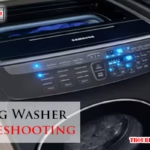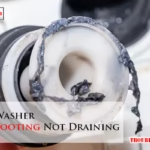Have you ever found yourself sweating in frustration because your Ruud air conditioner isn’t working as it should? You rely on it to keep your home cool and comfortable, but when something goes wrong, it can quickly turn into a headache.
The good news? Many common AC issues can be resolved without the need for an expensive service call. By understanding a few troubleshooting tips, you can save time, money, and stress. Stick with me, and I’ll guide you step by step through the most common Ruud air conditioner problems—and how to fix them.
Let’s get your AC back to doing what it does best: keeping you cool and worry-free.

Credit: www.youtube.com
Common Issues With Ruud Air Conditioners
Ruud air conditioners may face issues like poor cooling, unusual noises, or frequent cycling. Dirty filters and thermostat problems are common culprits. Regular maintenance and simple troubleshooting can often resolve these concerns effectively.
Common Issues with Ruud Air Conditioners If your Ruud air conditioner isn’t working as it should, you’re not alone. Like any appliance, air conditioners can develop problems over time. The good news? Many of these issues are easy to identify and sometimes even fix yourself. Let’s look at some of the most common problems Ruud air conditioners experience and how you can address them. —1. Weak Or No Airflow
A common issue with Ruud air conditioners is weak or no airflow from the vents. This often happens when the air filter is clogged with dust and debris. A dirty filter blocks airflow and forces your system to work harder than it should. To fix this, check your air filter. If it looks dirty, replace it with a new one. You should also make it a habit to clean or replace your filter every 1–3 months, depending on usage. If the problem persists, check the vents around your home. Are they blocked by furniture or curtains? Clearing obstructions can improve airflow dramatically. —2. Ac Not Cooling Properly
Is your Ruud air conditioner blowing warm air? This can be frustrating, especially during a heatwave. One potential cause is low refrigerant levels. If the refrigerant is leaking, your AC can’t cool your home effectively. You’ll need a professional technician to locate and fix refrigerant leaks. However, before calling for help, ensure your thermostat is set to “cool” and the temperature is lower than the room temperature. Sometimes, the problem is as simple as an incorrect setting. Another possibility is dirty coils. Outdoor condenser coils can get covered in dirt, reducing efficiency. Spray them gently with a garden hose to remove debris. —3. Strange Noises
Hearing unusual sounds like banging, rattling, or squealing from your Ruud AC? Don’t ignore them. These noises often signal mechanical issues, such as a loose fan blade or a failing motor. Turn off your AC immediately to avoid further damage. Check the outdoor unit for any visible obstructions like sticks or leaves. If everything looks fine, it’s best to call a technician for a thorough inspection. —4. Unit Frequently Turns On And Off
Does your air conditioner cycle on and off too often? Short cycling can wear out your system and increase energy bills. This issue may stem from an oversized unit, a malfunctioning thermostat, or dirty components. First, check your thermostat. Is it positioned near a heat source like a window or an oven? Relocating it can solve the issue. If the unit is oversized, it might cool your home too quickly and shut off before completing its cycle. Unfortunately, this isn’t something you can easily fix, but a professional can offer solutions like adjusting settings or adding a zoning system. —5. Water Leaks
Water pooling around your Ruud air conditioner is never a good sign. Leaks often happen when the drain line is clogged with dirt or algae. This blockage forces water to back up and leak out. To fix this, locate the drain line and flush it with a mixture of vinegar and water. You can also use a wet/dry vacuum to clear stubborn clogs. If the problem continues, the issue may be a broken condensate pump or a frozen evaporator coil. In either case, calling a professional is the safest option. —6. High Energy Bills
If your energy bills have spiked recently, your Ruud AC might be the culprit. An inefficient system uses more electricity than necessary. This often happens due to dirty filters, worn-out parts, or poor maintenance. Start by cleaning or replacing the air filter. Then, schedule a professional tune-up to ensure all components are working efficiently. Investing in regular maintenance can save you money in the long run. — Addressing these common Ruud air conditioner issues can keep your home cool and comfortable. Which of these problems have you faced before? If you’re unsure how to proceed, don’t hesitate to seek professional assistance. It’s better to fix the issue now than deal with a bigger problem later.Air Conditioner Not Turning On
Is your Ruud air conditioner not turning on? This issue can disrupt your comfort during hot days. Several factors can cause this, from simple power problems to internal system faults. Below, you’ll find steps to troubleshoot the issue and restore your cooling system.
Checking Power Supply
Start by verifying the power supply to your air conditioner. Check if the unit is plugged in securely. Inspect the outlet to ensure it’s delivering power. Use another device to test the outlet, confirming it’s functional. Look for any signs of damage to the power cord, such as fraying or loose connections.
Inspecting The Thermostat
Examine the thermostat settings to ensure proper operation. Make sure the device is set to “cool” mode and the temperature is lower than the current room temperature. Check if the thermostat has working batteries. Replace them if needed. If the thermostat is wired, inspect the connections for any loose or damaged wires.
Resetting The Circuit Breaker
Locate the circuit breaker panel in your home. Identify the breaker connected to your air conditioner. Look for signs of a tripped breaker, such as an off position or visible red indicator. Flip the breaker switch off, then turn it back on. This resets the circuit and may fix the issue. If the breaker trips again, consult a professional to inspect for electrical faults.
Insufficient Cooling
Is your Ruud air conditioner not cooling as it should? Insufficient cooling can make your home uncomfortable during hot days. Several common issues may cause this problem. By addressing these, you can restore your AC’s performance and enjoy a cooler home.
Cleaning Or Replacing The Air Filter
A dirty air filter can block airflow and reduce cooling efficiency. Check your air filter every month during the cooling season. If it looks dusty or clogged, clean or replace it. Disposable filters should be replaced, while reusable ones can be washed. A clean filter allows proper airflow and helps the AC cool effectively.
Inspecting The Refrigerant Levels
Low refrigerant levels can result in poor cooling performance. Refrigerant absorbs heat and releases it outside. If there’s a leak, your AC won’t cool properly. Inspect for refrigerant leaks or call a professional to check the levels. Recharging the refrigerant or fixing leaks restores cooling efficiency.
Ensuring Proper Airflow
Blocked vents or ducts can limit airflow, reducing cooling performance. Check all supply and return vents to ensure they are open and unobstructed. Furniture or curtains can block vents, so rearrange as needed. Clear ducts of any dust or debris to maintain smooth airflow throughout your home.
Unusual Noises From The Unit
Have you noticed your Ruud air conditioner making strange noises? Unusual sounds can be more than just an annoyance—they’re often a sign that something’s not quite right with your unit. Understanding what’s causing the noise can save you time, money, and possibly prevent bigger issues down the road.
Examining Loose Components
Rattling or banging sounds might mean there are loose components inside your AC. Over time, screws, bolts, or panels can shake free due to constant vibrations. A quick inspection of the exterior panels and screws can reveal if something needs tightening.
Pay attention to any small parts that may have fallen inside the unit. A misplaced screw can create unnecessary noise and further damage. Always turn off the power to the AC before inspecting it to avoid injury.
Cleaning The Fan Blades
If your unit sounds like it’s humming or clicking, dirty fan blades might be the culprit. Dust and debris can collect on the blades, causing imbalance and noise during operation. A simple cleaning can make a big difference in how smoothly your fan runs.
Use a soft cloth or a brush to gently clean the blades. Avoid using water or harsh cleaning solutions as they might damage the unit. Once clean, spin the blades manually to ensure they move freely without resistance.
Checking The Compressor
A buzzing or clanking noise often points to an issue with the compressor. The compressor is essentially the heart of your AC, and problems here can lead to reduced cooling efficiency. Sometimes, a loose part inside the compressor can cause the noise, or it could be a more serious mechanical issue.
If you suspect compressor trouble, it’s best to call a professional technician. Attempting to fix it yourself can be risky and might void your warranty. Don’t ignore compressor noises; addressing them early can save you from a costly replacement.
Have you experienced any of these noises with your Ruud air conditioner? Taking action sooner rather than later can keep your unit running smoothly and your home cool and comfortable. What steps will you take to troubleshoot your AC today?
Water Leaks Around The Unit
Water leaks around your Ruud air conditioner can cause stress and damage. These leaks often signal issues that need immediate attention. Fixing them quickly prevents more serious problems like mold or water damage. Below are simple steps to troubleshoot the common causes of water leaks.
Clearing The Drain Line
The drain line removes moisture collected during cooling. If it’s clogged, water backs up and leaks around the unit. First, turn off your air conditioner to avoid electrical hazards. Locate the drain line near the indoor unit and inspect it for dirt or debris. Use a wet-dry vacuum or a pipe cleaner to remove the clog. Flush the line with warm water to ensure it’s completely clear.
Inspecting The Drain Pan
The drain pan catches excess water from the air conditioning process. Over time, it can crack or rust, causing leaks. Check the drain pan for any visible damage. If you find cracks or holes, replace the pan to prevent further leaks. Ensure the pan is properly aligned so water flows into the drain line.
Checking For Frozen Coils
Frozen coils can lead to leaks as the ice melts and overflows the drain pan. Inspect the coils for frost or ice buildup. Turn off your air conditioner and let the ice melt naturally. Low refrigerant levels or poor airflow often cause frozen coils. Clean or replace dirty air filters to improve airflow. Contact a technician to check refrigerant levels if freezing persists.

Credit: indoortemp.com
Unit Frequently Cycles On And Off
Is your Ruud air conditioner cycling on and off too often? This issue, known as short cycling, can make your home uncomfortable and cause unnecessary wear on your unit. Don’t panic—it’s a common problem with actionable fixes. Let’s break it down step by step so you can restore your system’s efficiency and save yourself from potential costly repairs.
Adjusting The Thermostat Settings
Start with the thermostat—it’s often the root cause of frequent cycling. Check if your thermostat is set to a temperature that’s too low. Cooling your home too aggressively can force the unit to work harder than it should.
Try raising the temperature by a couple of degrees and see if the cycling stops. Also, ensure the thermostat isn’t in direct sunlight or near a heat source, as this can trick it into thinking your home is hotter than it is. If you’re using a programmable or smart thermostat, double-check its schedule to avoid unnecessary cooling cycles.
Inspecting The Capacitor
The capacitor is a small but vital part of your air conditioner that helps start the compressor. If it’s faulty, your unit may struggle to stay on, leading to frequent cycling. Look for signs like a humming noise or the unit failing to start properly.
Capacitors aren’t something you should replace on your own unless you’re experienced with electrical components. A licensed HVAC professional can safely inspect and replace it if necessary. Skipping this step could lead to further damage, so don’t ignore it.
Ensuring Proper Unit Sizing
Did you know that an air conditioner that’s too big for your home can cause short cycling? Oversized units cool the space too quickly, shutting off before they’ve had a chance to dehumidify properly. This rapid on-and-off cycling wastes energy and leaves your home feeling clammy.
If you suspect your unit might be oversized, consult with an HVAC technician. They can perform a load calculation to determine if your AC is the right size for your home. If resizing isn’t an option right now, you can focus on balancing airflow to minimize the issue.
Have you experienced short cycling with your Ruud air conditioner before? How did you solve it? Share your thoughts or questions in the comments below—we’d love to hear from you!
Weak Airflow From Vents
Is your Ruud air conditioner leaving you sweating with weak airflow from the vents? Don’t let frustration take over just yet. Weak airflow can stem from simple issues that you can fix without calling a technician. Let’s dive into practical troubleshooting steps you can take to get your AC back to delivering the cool breeze you need.
Cleaning The Ductwork
Dirty ductwork could be the silent culprit behind your weak airflow. Dust and debris build up inside your ducts, making it harder for air to flow freely. Grab a flashlight and inspect the inside of your vents. If you see dust or dirt clinging to the walls, it’s time for a thorough cleaning.
You can use a vacuum with a hose attachment to remove the grime. For tighter spaces, consider using a flexible brush to get into those hard-to-reach areas. Don’t forget to clean the vent grilles too—they often collect dust and can block airflow.
Have you cleaned your ductwork recently? If not, regular maintenance can prevent airflow issues and improve the efficiency of your Ruud air conditioner.
Checking For Obstructions
Sometimes, the issue is as simple as an obstruction. Items like furniture, curtains, or rugs could block your vents without you even realizing it. Take a look around the room where you’re noticing weak airflow. Are the vents fully exposed?
Move any objects that might be covering the vents. Even partially blocked vents can reduce airflow significantly. If your vents are clear, check inside them for anything that might have fallen in, such as toys or debris.
Have you considered how room layout might affect airflow? Rearranging furniture could solve the problem faster than you think.
Inspecting The Blower Motor
If cleaning and removing obstructions haven’t improved your airflow, the issue might lie with the blower motor. This component is responsible for pushing air through the system, and a malfunction can cause weak airflow.
Start by listening for unusual noises coming from the AC unit. Whirring, grinding, or buzzing sounds could indicate a problem with the blower motor. You can also check the motor visually for signs of wear or damage.
Are you comfortable handling basic repairs? If not, don’t hesitate to contact a professional to inspect the blower motor and replace it if needed.
Bad Odors From The Air Conditioner
Bad odors from your Ruud air conditioner can be frustrating. They can make your home uncomfortable and unpleasant. These smells often come from mold, bacteria, or dirt buildup. Understanding the cause helps you fix the issue quickly. Below are some common solutions to eliminate bad odors.
Cleaning The Evaporator Coils
Dirty evaporator coils can trap moisture and promote mold growth. This leads to unpleasant smells. Turn off your air conditioner before cleaning. Use a soft brush or cloth to wipe the coils gently. Apply a coil cleaner to remove stubborn dirt and debris. Regular cleaning keeps the coils free of bacteria and mold.
Replacing The Air Filter
A clogged air filter may be the source of bad odors. It can collect dust, mold, and allergens over time. Check the filter for visible dirt or damage. Replace it if it looks dirty or worn out. Use high-quality filters for better air circulation. Clean filters also improve indoor air quality.
Using A Mold Removal Spray
Mold growth inside the air conditioner can cause persistent odors. Spray a mold removal solution on affected areas. Focus on coils, vents, and other damp spots. Follow the instructions on the product label for safe use. Mold sprays help eliminate odors and prevent future growth. Ensure the unit is dry before turning it back on.

Credit: www.youtube.com
Conclusion
Troubleshooting a Ruud air conditioner doesn’t have to feel overwhelming. Start with simple checks like the thermostat or power supply. Clean filters and coils regularly to maintain efficiency. For more complex issues, contacting a professional is the safest choice. Regular maintenance can prevent many common problems and extend the unit’s life.
Always follow the user manual for guidance and safety. With these steps, you can keep your AC running smoothly. A well-maintained system ensures comfort during hot days and peace of mind year-round.





